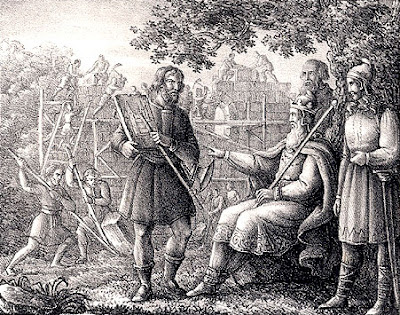 Spells of Eorde
Spells of Eorde
Eorde provides great strength and bounty.
1st Level: Command, Create Water (reversible), Cure Light Wounds, Detect Evil, Protection from Evil (+3 if standing on natural earth), Purify Food and Drink, Remove Fear, Resist Cold, Sanctuary (save is 4 harder if at least 2d4 Anglo-Saxons are within 30'), Detect Snares and Pits (D), Shillelagh (D), Hold Portal*, Enlarge*
2nd Level: Augury, Bless, Delay Poison, Find Traps, Know Alignment, Hold Person (save is 2 harder if standing on natural earth), Holy Chant, Resist Fire, Reveal Charm, Spiritual Weapon (appears wielded by a landwight), Stumble (D), Strength*
3rd Level: Animal Growth, Cure Blindness, Cure Disease, Dispel Magic, Glyph of Warding, Locate Object (if it is resting on natural earth), Prayer, Remove Cure (reversible), Striking, Plant Growth (D) (crops only), Snare (D), Stoneshape (D), Clairaudience*, Explosive Runes*, Haste* (reverse), Protection from Normal Missiles*
4th Level: Create Food and Water, Cure Serious Wounds, Detect Lie, Divination (requires standing on natural earth), Protection from Evil 10' Radius (+3 if standing on natural earth), Speak with Plants (if crops), Protection from Electricity (D), Enchant Arms* (they do gain an actual +1 bonus to hit and to damage), Move Earth (Lesser)*, Teleport* (requires standing on natural earth to travel to a place of the same)
5th Level: Atonement, Commune, Cure Critical Wounds, Dispel Evil, Quest, Plane Shift (as Teleport*, above), Commune with Nature (D) (on natural earth), Transmute Rock to Mud (D, reverse), Conjure Elemental (Earth, though spell will end if caster is distracted)*, Interposing Hand*, Passwall*, Wall of Stone*
6th Level: Find the Path, Heal, Stone Tell (works on natural soil too), Summon Spirit (Landwight, see below), Word of Recall (as Teleport*, above), Transport via Plants (D, crops only), Forceful Hand*, Move Earth*
7th Level: Earthquake, Holy Word, Regenerate, Restoration, Transmute Metal to Stone (as Transmute Metal to Wood, D, but turns metal to stone instead), Phase Door*, Statue*
Landwights
- Spirits that can take physical form for brief periods of time, as described in Volume IV.
- Often associated with Eorde and other naturalistic Anglo-Saxon divinities, and can sometimes even be summoned by their followers via the Summon Spirit spell.
- Can appear as either animals, plants, giants, dragons, satyrs, or nymphs.
- For those who are respectful when visiting their natural places, they will (roll 1d12): [1-3] provide succor, [4-5] charm,
[6-10] ignore, [11+] waylay, get lost, or lead to danger
*For those who are disrespectful, add 4 to the d12 roll.
- Can also use 1d6 of the following 14 spells at will.
1st Level: Cure Light Wounds (from damage taken in the landwight's area), Entangle (D), Locate Creature (D), Speak with Animals (D)
2nd Level: Augury, Barkskin (D), Charm Person or Mammal (D), Find Plant (D)
3rd Level: Animal Growth, Remove Curse (reversible), Call Lightning (D)
4th Level: Create Food and Water, Speak with Plants (D), Summon Sylvan Beings (D)
5th Level: Commune with Nature (D)
Next week: our series on Anglo-Saxon divinities continues with clerics of Hengist and Horsa!







.png)
,_G._Bussiere,_1897.jpg)


_(14566840917).jpg)


.png)





